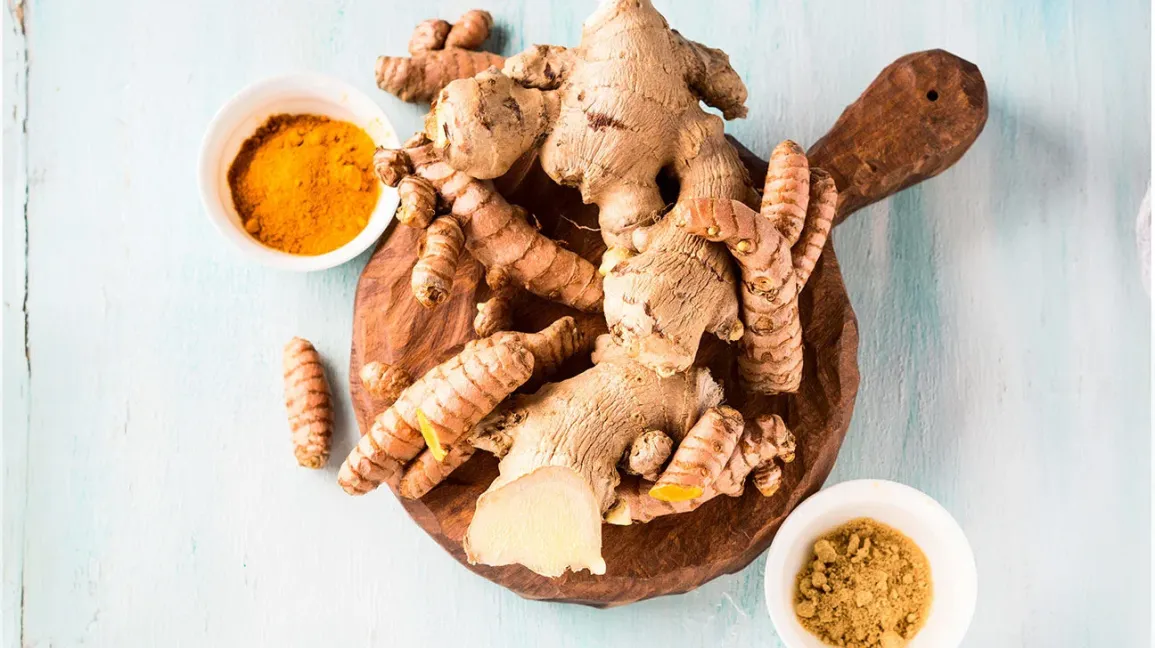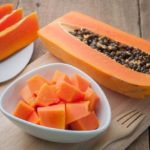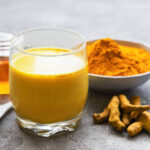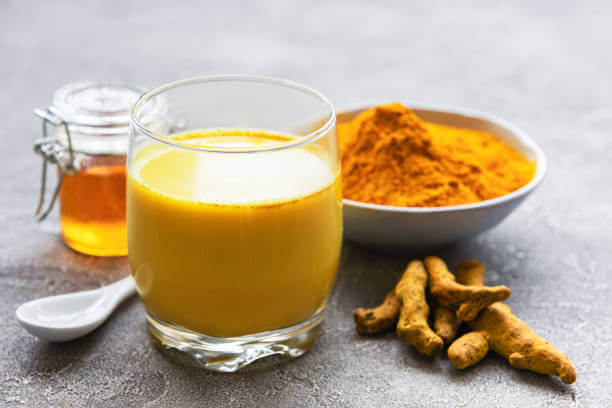Amazing Health Benefits of Turmeric and Ginger
Health benefits of turmeric and ginger are quite enormous. As it is, turmeric and ginger are well-known spices and supplements with roots in Asian traditions. Both belong to the Zingiberaceae plant family and have been integral to traditional medicine in India and China for centuries.
Turmeric has been traditionally utilized to relieve common colds and treat various disorders affecting digestion, skin, and the upper respiratory tract. It is most renowned for its anti-inflammatory properties.
Ginger, on the other hand, is commonly used for its digestive benefits, particularly in alleviating nausea and pain, and it is also valued for its contributions to immune health.
Combining ginger and turmeric may enhance their individual benefits, potentially reducing inflammation and alleviating symptoms of inflammation-related conditions such as arthritis, digestive diseases, and diabetes.
However, it’s important to note that there may be potential risks associated with taking these two together, which should be considered.
Benefits of Turmeric
Turmeric is renowned for its anti-inflammatory properties, primarily due to curcumin, a powerful micronutrient found in the spice. Research indicates that curcumin can help manage several inflammatory conditions such as metabolic syndrome, arthritis, and hyperlipidemia.
Here are some specific conditions that turmeric may benefit:
- Inflammatory Bowel Disease (IBD): A systematic review suggests that curcumin can help reduce inflammation in ulcerative colitis and Crohn’s disease, the two main types of IBD.
- Common Cold: A recent study showed that taking curcumin supplements for 12 weeks reduced the duration of the common cold in healthy Japanese adults.
- Arthritis: Numerous studies indicate that turmeric supplements can alleviate pain and inflammation in various forms of arthritis, including ankylosing spondylitis, rheumatoid arthritis, osteoarthritis, and gout.
- Metabolic Syndrome: Some studies suggest that curcumin supports healthy blood lipid levels, blood sugar levels, and blood pressure, all of which are crucial factors in metabolic health that influence the risk of diabetes and heart disease.
Despite these promising findings, there are significant variations in the sample size, quality, and dosage of the studies. Moreover, curcumin is an unstable substance with poor bioavailability, making it challenging to confirm its benefits conclusively.
SEE ALSO: How To Make Mango Custard
Benefits of Ginger
Ginger is widely used to combat motion sickness and nausea, thanks to its over 100 active compounds, including gingerols and parasols. These compounds offer various health benefits:
Health Benefits of Ginger:
- Pregnancy-Related Nausea: Studies show that ginger can effectively reduce mild nausea and vomiting during pregnancy without significant health risks.
- Pain Relief: Ginger’s compounds act as antioxidants, helping to relieve pain. Research reviews have found that ginger effectively alleviates pain in conditions such as menstrual cramps (dysmenorrhea), delayed onset muscle soreness, osteoarthritis, chronic low back pain, and migraines.
- Type 2 Diabetes: One study discovered that ginger supplementation improved fasting blood sugar, hemoglobin A1C levels (an indicator of blood sugar control), and blood lipid markers in participants with type 2 diabetes.
- Seasonal Allergies: Ginger supplements have been shown to enhance quality of life and reduce nasal symptoms in patients with allergic rhinitis, commonly known as seasonal allergies or hay fever.
While ginger is often recommended for motion sickness, most studies have not found it to be effective for this use. Additionally, many studies on ginger have produced mixed results, involved small sample sizes, and used varying dosages.
Benefits of Taking Turmeric and Ginger Together
While research on the combined benefits of turmeric and ginger is limited, some studies have shown promising results.
In a recent study, participants with knee osteoarthritis were given an herbal supplement containing turmeric extract, ginger, and black pepper, compared to Naproxen—a nonsteroidal anti-inflammatory drug (NSAID). After four weeks, the participants experienced significant decreases in prostaglandin E2 (PGE2), a compound associated with inflammation in conditions like arthritis.
Black pepper enhances turmeric’s bioavailability, improving the body’s ability to absorb it. This may have contributed to the enhanced benefits observed in the study.
Both turmeric and ginger possess antioxidant and anti-inflammatory properties and are generally well-tolerated by most individuals. Combining them may help reduce inflammation and combat oxidative stress in the body.
Additionally, a recent study suggested a synergistic effect between turmeric and ginger in fighting inflammation. However, this study was conducted on animals and human cells in test tubes, highlighting the need for further research on human subjects to confirm these effects.
How to Take a Combination of Turmeric and Ginger
Taking a combination of turmeric and ginger is commonly done through supplements, which are readily available in the market, especially those marketed for joint health or inflammation reduction.
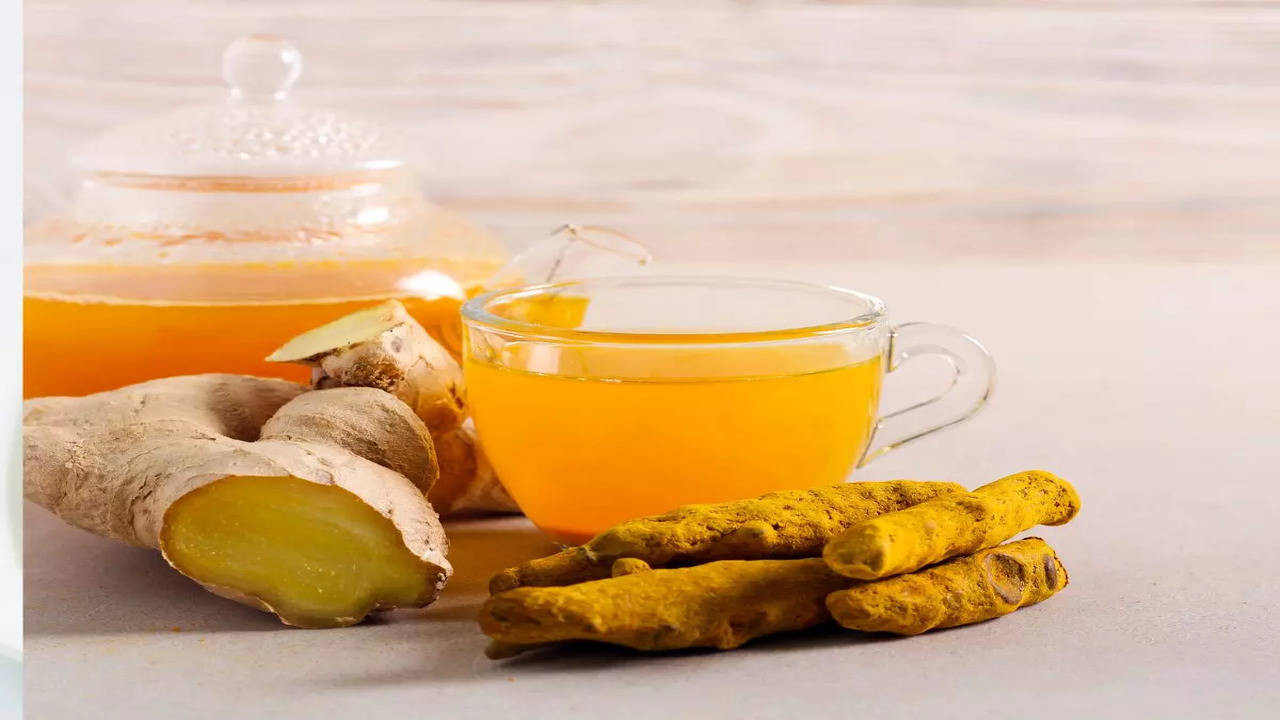
Forms of Supplements:
- You can find several combined turmeric and ginger supplements, as they are often paired together due to their complementary benefits.
- These supplements usually come in the form of capsules or pills, so it’s advisable to have a glass of water nearby to aid in swallowing.
Administration:
- Manufacturers typically recommend taking ginger and turmeric supplements with a meal to enhance absorption and minimize gastrointestinal discomfort.
Dosage Recommendations:
- Studies on these supplements often suggest splitting the total daily dosage into multiple smaller doses throughout the day. This approach may help with absorption, especially considering the challenges of absorbing curcumin.
- Whether you need to split the dose depends on the dosage strength and the manufacturer’s instructions for the specific supplement you’re using.
Considerations:
- It’s worth noting that some supplements may contain piperine, an active component of black pepper known to significantly enhance the bioavailability of curcumin. This can enhance the effectiveness of the supplement.
When selecting a turmeric and ginger supplement, consider factors like dosage, bioavailability enhancers such as piperine, and any specific instructions provided by the manufacturer.
Always consult with a healthcare professional before starting any new supplement regimen, especially if you have underlying health conditions or are taking other medications.
Dosage Recommendations
Currently, there isn’t sufficient research to establish a recommended combined dosage for turmeric and ginger supplements. However, individual dosages for each supplement have been studied:
Turmeric Dosage:
- Turmeric has demonstrated benefits at doses ranging from 500-8,000 milligrams (mg) per day.
- Turmeric extract is commonly taken at doses of 1.5 grams (g), or 1,500 mg, per day for up to three months.
Ginger Dosage:
- Ginger is typically consumed at doses of 0.5–3 grams (g) per day for up to 12 weeks.
- Studies suggest that doses of less than 1,500 mg per day are effective for relieving nausea during pregnancy.
When considering a turmeric and ginger supplement, it’s important to consult with a healthcare professional to determine the most appropriate dosage for your individual needs and health conditions.
Safety Considerations
General Safety:
- Both turmeric and ginger are generally safe for healthy adults.
- However, more research is needed to assess the potential risks associated with high-dose ginger and turmeric supplements.
Special Considerations:
- Ginger supplements may be safe for relieving nausea or vomiting during pregnancy, but caution is advised with turmeric supplements during pregnancy or breastfeeding due to higher concentrations than those found in food.
Supplement Quality:
- Since the FDA does not regulate supplements for purity and potency, it’s essential to choose third-party tested supplements to ensure accuracy and safety.
- Look for reputable third-party testers such as U.S. Pharmacopeia, NSF, and ConsumerLab to ensure the supplement meets quality standards.
Potential Drug Interactions
Blood-Related Medications:
- Turmeric and ginger may affect blood clotting, blood sugars, and blood pressure, potentially interacting with medications that have similar effects.
- If you’re taking anticoagulants, anti-diabetes medications, or blood pressure medications, consult with your healthcare provider before starting a turmeric and ginger supplement to avoid potential interactions.
Can One Overconsume Turmeric or Ginger?
- Currently, there are no defined upper limits for the intake of turmeric and ginger. While using them as culinary additives is generally considered safe, the consumption of high-dose supplements may present potential risks or side effects.
- Regulatory bodies such as the European Food Safety Authority (EFSA) have determined that an intake range of 0–3 milligrams (mg) of curcumin per kilogram (kg) of body weight is deemed safe. For instance, this equates to 204 mg for an individual weighing 150 pounds and up to 340 mg for someone weighing 250 pounds.
- It’s crucial to note that this safety range pertains specifically to curcumin, not the overall intake of turmeric. Many turmeric supplements contain only about 3% curcuminoids, with curcumin representing only 50-80% of those. Hence, even with a 1,000 mg turmeric supplement, the curcumin intake likely falls within the EFSA’s established safety range.
- As per the FDA, consuming up to 4 grams of ginger root daily is considered safe. Nevertheless, higher doses may lead to potential side effects like irregular heartbeat, allergic reactions, gastrointestinal discomfort, central nervous system depression, and prolonged bleeding.
Potential Side Effects of a Turmeric and Ginger Combination
Despite their generally safe profile, excessive intake of turmeric and ginger, especially in supplement form, may result in side effects. Commonly reported side effects encompass abdominal discomfort, heartburn, diarrhea, mouth and throat irritation, headache, rash, and yellow stool.
Summary
Turmeric and ginger, renowned for their potent antioxidant and anti-inflammatory properties, may offer benefits in managing inflammatory conditions like arthritis and inflammatory bowel disease (IBD).
However, more research is warranted to substantiate the synergistic effects of turmeric and ginger.
While generally safe, it is prudent to consult with a healthcare professional before initiating a regimen of turmeric and ginger supplements, especially if concurrently taking medications or other supplements, to ensure compatibility and mitigate potential interactions.

A graduate of Computer Science and Information Management Technology. Diploma – Caregiving, Certificates – Dementia and Diabetes Awareness and Management. A researcher, blogger, songwriter, singer and acoustic guitarist. Born in an environment where natural talents such as healing are imparted at our natural birth. This natural talents of healing is the result of our genetic inheritance and the training from family environment.

